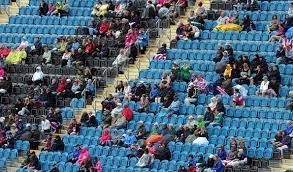[contextly_auto_sidebar]
 Or, worse, if it has more empty seats than people, as appeared to be the case at the Budapest Festival Orchestra’s concert at the Kennedy Center on Monday…
Or, worse, if it has more empty seats than people, as appeared to be the case at the Budapest Festival Orchestra’s concert at the Kennedy Center on Monday…
But wait!
The concert, on the whole, was blah, a disappointment, since on home turf this is, from everything I’ve heard, one of the most imaginative orchestras around.
But they thrilled me with their encore. In which they sang! The entire orchestra stood up, and — led by their music director, Ivan Fischer — beautifully sang a Russian liturgical piece, in a 19th century arrangement.
This would elevate any orcchestra evening. Takes it beyond the usual formatted orchestral program (one masterwork from column A, one from column B), and gives us musicians making music from the heart.
About that half-empty hall…
What to do if you have one: First, play even better than you’d play with a full house. For two reasons. Number one, to keep your integrity. Music matters, no matter how few people hear it.
Number two (and very important) — you want every person there to go home thrilled, and tell their friends how thrilled they were. If not many people came to your performance, than you need everyone who did come to be your ambassador. Your viral, word of mouth marketer.
The other thing you should do
You should do this even in a big space, like the Kennedy Center concert hall. Play the first piece on your program, so that latecomers can be seated in the seats they paid for.
And then invite everyone there to come closer. Speak to them as people that you care about. “We’re happy that you’re here. And now we want to make this evening special. Please come closer to us! Move to seats that are closer to the stage. And we’ll play the concert just for you, our friends.”
Maybe, in a big venue, there are fire rules, or union regulations, that appear to forbid this. But I bet they can be circumvented, if a venue really wanted that.
And I’m certain that it’s what we ought to do.
One more thing. Do you — if your concert played to empty seats — beg people writing about it, whether in a review or in a blog or on Facebook — not to mention that? Big mistake! Cowardly. If you’re not selling enough tickets, own up to it, and fix the problem. Won’t you be more motivated, if people know you’ve got something to fix?
***
i’m happy to address questions like these in my consulting. If we want classical music to have a future, we need to make it much more human. And part of that is welcoming our audience, and being honest both with them and with our donors.

We must have been at different performances.
Yes, the concert was half empty, and it would have been nice if management invited people to fill seats closer to the stage. But to be fair to your readers, you should have explained that the reason the Kennedy Center was half empty had nothing to due with not selling enough tickets. It was because there was a severe snow and ice storm. Roads and sidewalks were iced and the metro and bus systems were curtailed. Even I contemplated not going because of concerns how I would get home.
As it was, the audience gave Fischer and his orchestra a rousing ovation. It seems that all in attendance except you and the Washington Post’s critic were thrilled by the BFO’s performance. From my chorister seat behind the orchestra, it was obvious Ivan Fischer and his orchestra were putting all they had into their performance. Bravo for them!
Recall NYT critic couple years ago calling the BFO, after Carnegie Hall concert, the world’s best symphony orchestra. Full stop. Doesn’t appear word has gotten around.
Excellent idea, having conductor invite everyone down front after first selection. Would generate wonderful word-of-mouth from audience after the concert.